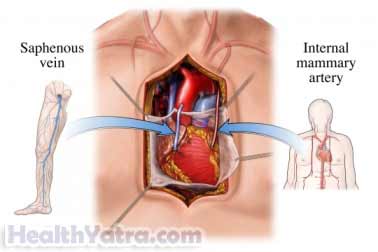Definition
Veins can sometimes be used to replace arteries that are diseased. The process of removing them is called harvesting.
Leg veins are frequently used for vein harvesting. For open chest procedures, likecoronary artery bypass grafting (CABG), veins or other blood vessels in the chest are often used.
Reasons for Procedure
Diseased arteries with atherosclerosis have a build up of plaque that can block the flow of blood. Coronary (heart) or carotid arteries to the brain are often repaired by making a bypass. Vein grafts are most often used to bypass these blocked arteries.

Possible Complications
Complications are rare, but no procedure is completely free of risk. There may include:
- Bleeding
- Damage to nerves
- Infection at the vein harvesting site
Factors that may increase the risk of complications include:
- Smoking
Talk to your doctor about any factors that may increase your risk.
What to Expect
Prior to Procedure
The preparation you will need will be determined by the primary procedure. In most cases, it will be a major cardiac or vascular surgery for which you will be hospitalized and evaluated thoroughly.
Talk to your doctor about your medicines. You may be asked to stop taking some medicines up to one week before the procedure, like:
- Aspirin or other anti-inflammatory drugs
- Blood thinners, such as clopidogrel (Plavix) or warfarin (Coumadin)
- Statins or cholesterol medicine
- Certain medicines for diabetes
You will not be able to eat or drink for 8 hours prior to the procedure.
Anesthesia
You will be given general anesthesia. It will make you sleep.
Description of Procedure
Traditional Technique
A long cut in the skin will be made to expose the entire length of the vein. Every branch of the vein will be found and tied off. The vein will be removed. The skin will be closed with stitches or staples.
Endoscopic Technique
Two small incisions are made at either end of the vein. A special long, thin tool with a camera on the end (endoscope) is passed through one of the incisions and along the vein. The tool will separate the vein from its branches and surrounding tissue. The vein will then be removed through the second incision at the other end of the vein.
Immediately After the Harvesting
The primary surgery will take place. Your leg (or legs) will be wrapped tightly to prevent bleeding from the remaining veins.
How Long Will It Take?
Vein harvesting is usually done at the same time as the primary procedure. It does not add time to the total surgery.
How Much Will It Hurt?
Leg pain from the long incision method may be significant. Talk to your doctor about a plan to manage pain.
Average Hospital Stay
Your hospital stay will depend on your primary procedure. Vein excision will not extend your stay.
Postoperative Care
You will need to take care of your bandages and stitches. Ask your doctor about when it is safe to shower, bathe, or soak in water. To ensure a smooth recovery, be sure to follow your doctor’s instructions.
Call Your Doctor
After you leave the hospital, contact your doctor if any of the following occurs:
- Signs of infection, including fever and chills
- Redness, swelling, increasing pain, excessive bleeding, or any discharge from the incision site
- Pain that you cannot control with the medicines you have been given
- Any changes of color in your leg, or if your leg becomes cold, numb, or tingly
- Cough, shortness of breath, or chest pain
- Dizziness or weakness
- Calves that are red, swollen, or warm to the touch
In case of an emergency, call for medical help right away.
